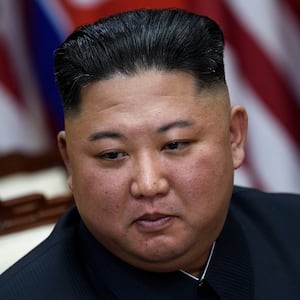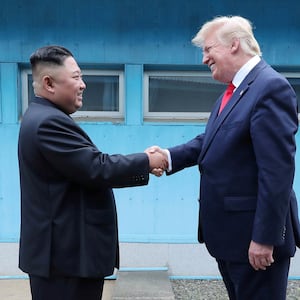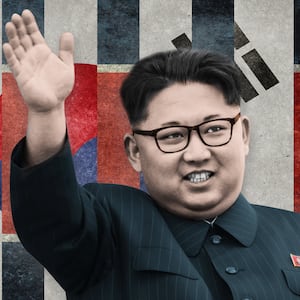President Joe Biden will deploy his charmingest smile and fluffiest turns of phrase when he hosts South Korea’s President Moon Jae-in at the White House on Friday and tries to convince him: We’re doing exactly what you want when it comes to North Korea.
The main point of the summit will be to patch up a growing rift between South Korea and the U.S. With less than a year left as president, Moon longs to meet North Korea’s Kim Jong Un one more time and burnish his legacy as the leader bearing peace in our time to the Korean peninsula.
The way the White House has planned the meeting, the first between the two since Biden’s election, is all to get Moon to go along with U.S. wishes like every other South Korean president. On the way, Biden and Moon will be echoing the same clichés about the tightness of the U.S.-Korean alliance and the need to talk to North Korea.
Toward that end, the White House and State Department have crafted a disinformation campaign, or at least a con game, in which they make believe “there’s no daylight” between the Americans and South Koreans even as the alliance unravels.
The real story, as Sue Mi Terry, a former CIA analyst, made clear in her role as Korea chair at the Center for Strategic & International Studies (CSIS), is that “we’re at an impasse” with North Korea and there’s “nothing the Biden administration has shown” to break it. Nor is Biden’s team “expecting any breakthrough with North Korea,” while “acknowledging they don’t have any idea of what to do,” she told a CSIS panel.
Those words might appear as a reality check for policy-makers like Secretary of State Antony Blinken and Jake Sullivan, Biden’s national security adviser. They’re the ones who oversaw what they claim has been a thorough “review” of policy on North Korea, and they should know how little things have changed.
It’s same old, same old as they try to revive an alliance in which Moon, the “progressive,” has wanted to show that he doesn’t need the U.S. Instead, by cozying up to North Korea’s big brother China, he has done his best to break down the ties that have bound South Korea to the U.S. from the Korean War onward.
Biden, however, may do Moon one favor that may make amends for differences over North Korea. He may assure Moon that the U.S. will be sending vaccines. Credited with having worked effectively against COVID-19, South Korean authorities worry about their lagging vaccination campaign—only 5 percent of the country’s 52 million people have been vaccinated—and fear the pandemic won’t go away.
Time is of the essence. “It would be great for the alliance to work together on global health,” Victor Cha, who was with the National Security Council during the presidency of George W. Bush and is now a professor at Georgetown, told The Daily Beast. “The hard part is South Korea’s need for U.S. vaccines now. I don't know how that will turn out.”
Long term, Cha sees “a lot of potential for coming to terms on production.” He says Samsung biologics and SK bioscience “are high-end entities that could produce lots of vaccines and aid the U.S. effort to distribute vaccines to the world.”
South Korea’s desperation for vaccines plays into the dire need for semiconductors for American motor vehicle manufacturers.
“On chips,” said Cha, “Samsung will make a big announcement on new investments in chipmaking in the U.S.” That deal “quietly reflects a choice by South Korea to put high-end chip production in the U.S. and not in China, thus putting them on the right side of supply chains post-COVID.” (Other South Korean companies might follow with plans to produce electronic vehicles and high-capacity batteries in America.)
Right away, “Moon will claim that he has secured more vaccines and the alliance is as strong as ever,” said Lee Sung-yoon, at Tufts University’s Fletcher School. “The pro-Moon South Korean press will hail the meeting as a diplomatic victory for Moon.”
Getting together over North Korea, however, is another matter.
“Biden will be skeptical but remain polite and say he is open to talks with North Korea under the right circumstances—when North Korea shows clear signs of moving toward complete denuclearization,” Lee told The Daily Beast. “Moon will say the way to move Kim Jong Un toward the goal is by making concessions like suspension of sanctions and high-level meetings in order to build trust.”
As the sheen fades from the review, Team Biden want it known that they’re not falling for the failed policies of the two previous presidents.
They say they’re getting away from the “strategic patience” of Barack Obama and the extremes of Donald Trump—yes, the guy who called Kim “little rocket man” and threatened to rain “fire and fury” on the North in 2017. Then, in 2018, the same guy claimed to have fallen “in love” with Kim and got him to agree at their summit in Singapore to work for “denuclearization of the Korean peninsula.”
That’s a phrase from the brief joint statement Trump and Kim signed with a flourish for the gaping TV networks, which is sure to come up as the basis for future talks. That signing may have been the brightest moment of Trump’s presidency. The memory has now faded into the miasma of historical disillusionment, but Kurt Campbell, a veteran diplomat who’s now Indo-Pacific coordinator on the National Security Council, believes the summit can take off from there.
“Our efforts will build on Singapore and other agreements made by previous administrations,” he told Yonhap, the South Korean news agency. While “our policy towards North Korea is not aimed at hostility,” he made clear it’s still “aimed at ultimately achieving the complete denuclearization of the Korean peninsula”—diplomatic verbiage that promises not much, if anything.
In the cyclical manner of crisis and dialog, fresh meetings with the North are Moon’s only hope, and sweet talk and evasion will be Biden’s response when he sees him.
“First and foremost they will demonstrate the alliance is sound and strong,” said Kathleen Stephens, former U.S. ambassador to Korea, now president of the Korea Economic Institute, funded by the Korean government in Washington. “Commitment to the alliance,” she went on at a virtual panel staged by George Washington University’s Institute for Korean Studies, “is the highest priority.”
Meanwhile, “we’re acknowledging that a dramatic breakthrough is not likely,” said Frank Jannuzi, president of the Mansfield Foundation in Washington.
Timing is the catch. “The Moon administration is eager to use the last year of its office on a full-court press,” said Jannuzi, whereas “the Biden administration is working on a different timeline.”
Not that all members of team Biden favor alternating hard and soft lines to convince Moon they are really on his side while they are not. Bruce Bennett, long-time North Korea watcher at the Rand Corporation, told The Daily Beast he had “seen no direct evidence of arguing in back channels” at the White House, but surmised “that arguing has indeed been happening.”
Through it all, U.S. policy on North Korea remains pretty much the same despite negotiations with the North over the years.
“Denuclearization is still the goal,” said Victor Cha at the CSIS confab, where he runs Korean issues. The North has “a developed arsenal that continues to grow. We need to take this down branch by branch”—that is, go for small deals that will wind up with the North de-nuking in the end.
Joseph Yun, former U.S. point man on North Korea, believes America has just about given up on CVID—complete verifiable irreversible denuclearization. “The U.S. does not think they can get it,” he said on another panel discussion. “They really don’t talk about CVID. They are thinking about it as a long-term project. They are much more realistic.”
Considering the history of negotiations with North Korea, Bruce Klingner, a former CIA official who’s been dealing with Korea issues for years at the conservative Heritage Foundation, put the dilemma this way.
“Biden officials continue to make claims of a ‘new course’ different from those of previous administrations.” However, he told The Daily Beast, “There are only so many tools in the tool box and only so many ways to build a policy house.” The Biden administration’s “proposed ‘calibrated’ and ‘careful modulated diplomatic approach,’” he said, appears “consistent with U.S. policies since the 1994 Agreed Framework.”
Sadly, the 1994 deal, under which the North agreed to give up its nuclear program in exchange for twin light water reactors, broke down after the Americans charged in 2002 that North Korea was secretly producing warheads with highly enriched uranium.
The chief architect of that agreement, Robert Gallucci, believes the latest policy review “was not enough” and called for “a more aggressive approach” toward “normalization of the DPRK,” the Democratic People’s Republic of Korea, as an “anormal country.”
Gallucci, retired U.S. ambassador-at-large, now at Georgetown, is annoyed that “we are essentially not trying to solve this problem” while focusing on Iran, which has cooperated with the North to develop its own nuclear arsenal. “Neither side is showing up,” he said at CSIS, meaning neither the U.S. nor North Korea wants to talk.
For Moon, however, a White House summit coming five weeks after Biden hosted Yoshihide Suga, prime minister of Japan—with which Korea remains on terrible terms from the era of Japanese colonialism—offers a chance to go home claiming understanding with the Americans. They will convince him they too are all for pressing ahead with negotiations even if they aren’t likely to happen right away.
Moon “will come out of the summit looking pretty good,” said Christopher Hill, the U.S. envoy who engineered six-party talks, including the two Koreas, China, Japan, Russia and the U.S—another failed effort at negotiating with North Korea. The summit “will showcase” the bond between the U.S. and Korea and “the warmth of the relationship.” Koreans “want to see we’re continuing to have a North Korean policy” with Moon “on top of his game,” he said at the CSIS panel.
That’s exactly how the Biden team wants Moon to feel, even as he emphasizes negotiations rather than denuclearization and glosses over human rights as South Korea abstains from UN resolutions condemning the North’s human rights abuses.
Moon, the Americans think, will be delighted to demonstrate how well he gets along with Biden in persuading him to subscribe to talks with the North. Having met Kim three times, he now has to battle sharply declining popularity thanks to inflation and skyrocketing real estate prices. Kim’s failure to respond to entreaties for more talks since the failure of the second Trump-Kim summit in Hanoi in 2019 adds to the misery.
Moon knows his conservative enemies are lying in wait to avenge the ouster and jailing of his predecessor, Park Geun-hye, in the Candlelight Revolution of 2016 and 2017. “South Korea and the U.S. cannot and should not accept North Korea as a nuclear power,” said Park’s last prime minister, Hwang Kyo-ahn, who ran against Moon for president in 2017. “The issue of human rights in North Korea is of great concern to South Korea.”
Those are the conditions to which the U.S. subscribes while Moon sublimates them for fear of offending the North and derailing his faint hopes for another summit with Kim. “As long as we look for a diplomatic solution,” said Nick Eberstadt of the American Enterprise Institute, talking at the Committee for Human Rights on North Korea, “we’re assigning our leadership to a fool’s errand.”




